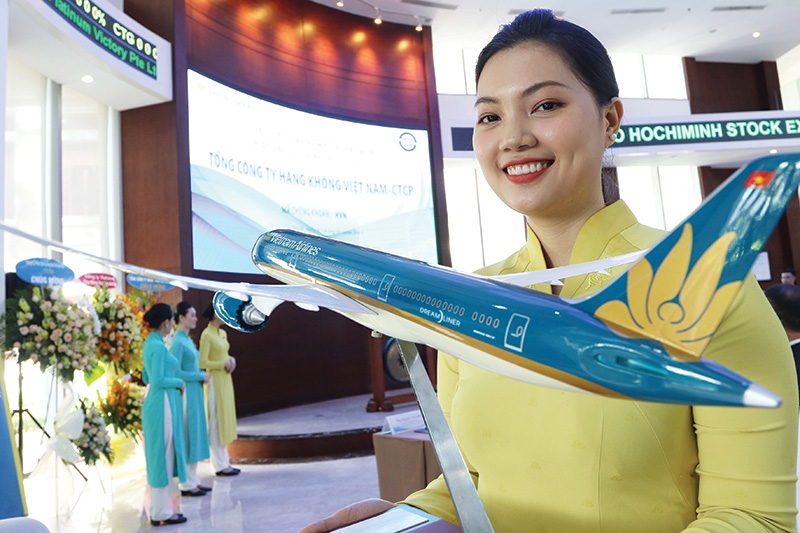Investors wait on VNA’s state divestment plans
 |
| Vietnam Airlines made its long-awaited debut on the Ho Chi Minh Stock Exchange on May 7, 2019 Photo: Le Toan |
Last Tuesday national flag carrier Vietnam Airlines made its debut on the Ho Chi Minh Stock Exchange, five years after its initial share sale to the public. The debut price was VND40,600 ($1.77) per share, which dropped down slightly to VND40,000 ($1.74) at the end of the first trading day and down further to VND39,350 ($1.71) on Wednesday. Upon listing, the airline’s market capitalisation was estimated at $2.5 billion, making it one of the biggest stocks on the exchange.
This is the first high-profile listing for a state-owned enterprise (SOE) this year. Similar to many fellow SOEs, only 6 per cent of Vietnam Airlines stakes are available for public trading. The bulk of stakes are still under control of the Committee for State Capital Management with 86 per cent, and Japan’s ANA Holdings, the only strategic foreign investor, with 8.8 per cent of ownership.
“Vietnam Airlines is likely to receive strong attention from foreign investors following this listing debut. This is a positive point for the airline in the short term,” said Che Thi Mai Trang, an analyst from Bao Viet Securities.
Trang predicted that the after-tax profit of the airline’s parent company in 2019 will reach VND2.9 trillion ($126 million). In the coming years, the airline can bet on its low-cost subsidiary Jetstar as well as its own better management of cash flow.
However, most analysts made it clear that in the long run, the appeal of Vietnam Airlines towards overseas investors relies heavily on the state divestment process, which is now behind schedule. Without a chance to buy in shares, large institutional investors and major airlines around the world may lose their interest in Vietnam’s flag carrier.
In response to these concerns, Vietnam Airlines chairman Pham Ngoc Minh repeated that the airline has submitted its divestment plan to the government, and it is likely that state ownership will be reduced to only 51 per cent. “It’s very important that we have a wider investor base and better market liquidity to continue the divestment process. We look forward to partnering with other major investors, who can be trusted partners for us in the future,” Minh said at the listing ceremony. He admitted that investors will have to wait a little longer as the divestment plan is unlikely to be finalised this year.
Josephine Yei, CEO of SaigonBank Berjaya Securities JSC, had a more optimistic view of the divestment plan. According to Yei, the listing itself shows that there is already progress in the state withdrawal strategy, and it is crucial for a national carrier like Vietnam Airlines to show investors it is committed to state divestments. “This builds confidence and sends an important message to the public,” said Yei.
For the state share sale, Vietnam Airlines and other SOEs might enjoy the benefits of a new rule. Last month the Ministry of Finance issued Circular No.21/2019/TT-BTC that provides a framework on the book building method for SOEs. The circular, which will take effect on June 3, 2019, allows SOEs and their book-runners to gauge investor demand on a share sale, through which they can determine a suitable price point for the transaction. Book building is widely used around the world and can be a technical boon to the appeal of the airline towards international investors.
Analysts believed that Vietnam Airlines might also benefit from the lessons drawn from Vinamilk and Sabeco’s share sales. The $4.8-billion state divestment of Sabeco in 2017 was the biggest public auction ever for an SOE, and the Ministry of Trade and Industry later noted in its reports that it has learned great lessons for future SOE share divestments.
“We’re positive about Vietnam Airlines, which upon listing belongs to the 30 biggest Vietnamese stocks, making it highly visible for foreign investment,” wrote analysts from Ho Chi Minh Securities. “Updates on the state divestment process and the airline’s commitment to becoming a five-star carrier will also help polish the image of a national airline.”
What the stars mean:
★ Poor ★ ★ Promising ★★★ Good ★★★★ Very good ★★★★★ Exceptional
Related Contents
Latest News
More News
- South Korean VC completes buyout of Chicken Plus Vietnam (February 25, 2026 | 07:55)
- Marico buys 75 per cent of Vietnam skincare startup Skinetiq (February 10, 2026 | 14:44)
- Mitsubishi acquires Thuan An 1 residential development from PDR (February 09, 2026 | 08:00)
- KKR and Singtel step up data centre investment in Southeast Asia (February 06, 2026 | 13:09)
- New rules ease foreign access to Vietnam equities (February 05, 2026 | 17:29)
- Vietnam’s IFC creates bigger stage for M&As (February 01, 2026 | 08:16)
- Game startup Panthera raises $1.5 million in seed funding (January 29, 2026 | 15:13)
- Cool Japan Fund transfers shares of CLK Cold Storage (January 28, 2026 | 17:16)
- Nissha acquires majority stake in Vietnam medical device maker (January 26, 2026 | 15:40)
- BJC to spend $723 million acquiring MM Mega Market Vietnam (January 22, 2026 | 20:29)

 Tag:
Tag:



















 Mobile Version
Mobile Version